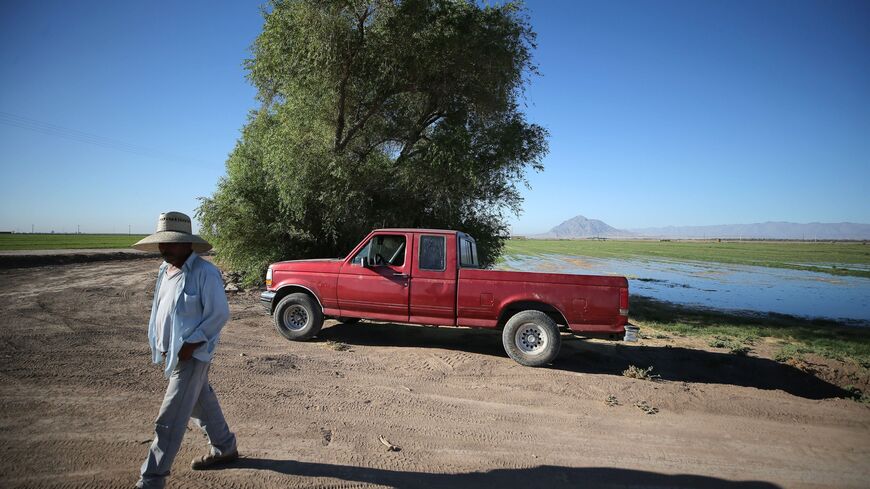The US state canceled the lease for one of Saudi dairy giant Almarai’s subsidiaries, saying it has been improperly pumping groundwater out of the desert.

October 7, 2023
The US state of Arizona terminated land leases with a subsidiary of Saudi Arabia‘s dairy giant Almarai this week, constituting the latest chapter in a battle over groundwater that could affect how the company and others from the Gulf operate.
The Riyadh-based Almarai is one of the largest food companies in the Middle East and reported a net profit of $453 million in 2022.
What happened: Gov. Katie Hobbs announced the decision on Monday. She said that Arizona has canceled one of Fondomonte’s leases of state land in the Butler Valley and will not renew the other three that expire in February 2024, according to local media.
Hobbs said in a statement that Fondomonte has been violating the terms of its lease since 2016 by pumping “unchecked amounts of groundwater out of our state while in clear default on their lease.”
Fondomonte, a subsidiary of Almarai, grows alfalfa on the land, which is used to feed Almarai’s cows in Saudi Arabia. The crop used to feed grazing livestock such as cattle, and according to official data, Arizona farms produced more than 2 million tons of alfalfa in 2022.
Fondomonte told Al-Monitor in a statement that it will appeal Arizona’s decision to cancel its lease and demonstrate to the state its compliance with lease requirements.
“We continue to be invested in Arizona and the wider Arizona agricultural industry. Fondomonte will continue to work with Gov. Hobbs and her administration to discuss groundwater matters moving forward,” said the company.
Fondomonte leased land in Butler Valley from the state in 2015. It also purchased private land in the nearby Vicksburg area in 2014. Both areas are west of the state capital, Phoenix. A Fondomonte spokesperson told Al-Monitor on Thursday that it spends more than $132 million annually in Arizona and its business activities support 998 jobs in the state.
It is beneficial to grow alfalfa in desert areas because it can be cut more times per year than in other climates. But the crop is also water intensive, which makes Arizona a better option for Saudi Arabia, given the kingdom’s water shortages.
Background: Political geography professor Natalie Koch of Syracuse University said that Almarai’s alfalfa operation in Arizona follows the kingdom’s ban on domestic production of green forage crops like alfalfa that went into effect in 2018.
“The (Saudi) government is very aware of the unsustainable agriculture practices that lead to a situation where the groundwater is no longer really able to sustain any substantial commercial agriculture,” said Koch, author of “Arid Empire: The Entangled Fates of Arizona and Arabia.”
How exactly Almarai came to use Arizona’s groundwater is especially controversial. Last year, the Arizona Republic reported that the state leased the land to Fondomonte at a below-market rate. However, the Fondomonte spokesperson said the rates are in line with others from the state.
But Koch said that water usage was a campaign issue for Hobbs. The Democrat took office in January after a tight election victory. “This is just the outcome of all of the legal work and the investigations that the state has actively been undertaking,” said Koch.
Why it matters: Almarai’s investment in Arizona comes amid Saudi Arabia’s quest for food security. Many Gulf states have sought agricultural production overseas, according to Kristin Smith Diwan, a senior resident scholar at The Arab Gulf States Institute in Washington
“The need for food security combined with the pressure to conserve resources — both capital and water — in-country has driven Gulf states to land purchases and agricultural production abroad,” she told Al-Monitor.
The issue extends beyond Arizona. The Gulf’s involvement in East Africa is particularly related to food security, according to Diwan.
“We have already seen some of the geopolitical consequences of this through Gulf political and military intervention in East Africa,” she added.
Gulf investment in Sudan has been going on for decades, including in the agriculture sector, as the region views the East African country as a potential food basket due to its relatively more fertile land. Gulf Cooperation Council countries import most of their food.
As for Arizona, the state’s water issues go beyond Saudi Arabia. Arizona experienced a drought this past summer, and relatively lax laws on water usage in rural areas persist, according to The Associated Press.
As for US-Saudi relations, Koch said she does not expect Arizona’s decision to have a major effect, though she pointed out that the Saudi government owns a stake in Almarai. The Saudi Agricultural and Livestock Investment Company, owned by the Public Investment Fund, possesses a 16.3% stake in Almarai, according to the latter’s website. The fund acquired the stake in 2017, Bloomberg reported at the time.
Know more: Almarai is not the only Gulf entity growing alfalfa in Arizona and the southwestern United States. The UAE’s Al Dahra also grows forage crops in the state as well as in neighboring California.
Koch said that she expects more pressure on Al Dahra in light of the Almarai case.
